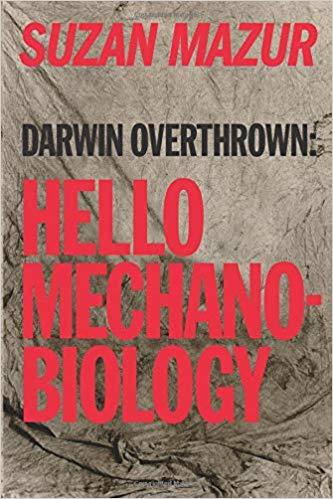Michael J. Behe's Blog, page 474
June 2, 2019
Babylon Bee: Earth cools due to Bill Nye’s ego

“We noticed the trend about three years ago, but it really accelerated over the past few months,” an EPA representative told reporters. “After controlling for solar activity and weather patterns, we determined that the biggest factor is the exponential growth in Bill Nye’s self-admiration. His expansive, pretentious hubris now casts a shadow large enough to shield most of the Earth from the warming effects of the sun.”
See also: Bill Nye as “a terrible spokesman for science”
and
“Neil DeGrasse Tyson” Debuts At The Babylon Bee In An Op-Ed
and
Goes Around, Comes Around: 500 Women Scientists Are Eating Bill Nye…
Copyright © 2019 Uncommon Descent . This Feed is for personal non-commercial use only. If you are not reading this material in your news aggregator, the site you are looking at is guilty of copyright infringement UNLESS EXPLICIT PERMISSION OTHERWISE HAS BEEN GIVEN. Please contact legal@uncommondescent.com so we can take legal action immediately.
Plugin by Taragana
June 1, 2019
Suzan Mazur: World Science Foundation Evening on Mars “marred,” so to speak, by a second-rate panel

Science writer Suzan Mazur didn’t seem to find the Templeton-sponsored World Science Foundation’s evening on Mars worth the $42 ticket price:
It is an understatement to say this gab session was a letdown following Martin Rees’s recent exacting presentation at Simons Foundation, where Rees referred to a post-human habitation of Mars.Suzan Mazur, “Part 2 – World Science Foundation Feeds Public Bogus Science and Profiles Attendees” at Oscillations
Noted astronomer Martin Rees is a hard act to follow, but still …
Rees was someone to whom Mazur could introduce her book, Darwin Overthrown. He seems comfortable with non-Darwinian origin of life researchers.
Unfortunately, this time out, a co-operation between NASA and Templeton resulted, in her account, in “a panel of lesser-known NASA and NASA-affiliated experts” saying nothing new.
But wait… she also reveals that a two-page survey was handed out, asking a number of none-o’-yer-business questions on behalf of “Audience Research & Analysis, an organization that helps government agencies and cultural agencies to “move forward with decision research.”
She scanned the survey into her story; go and see for yourself how much of your private business NASA, Templeton, and/or whoever would hope to find out if you paid to attend the meeting.
Suzan Mazur’s most recent book is Darwin Overthrown: Hello Mechanobiology (above)
See also: World Science Festival is purveying an out-of-date Darwinism
and
Astronomer Martin Rees Reacts To Suzan Mazur’s Darwin Overthrown
Also, on the subject of mass data-gathering, see Your phone knows everything now. And it is selling your secrets
Follow UD News at Twitter!
Copyright © 2019 Uncommon Descent . This Feed is for personal non-commercial use only. If you are not reading this material in your news aggregator, the site you are looking at is guilty of copyright infringement UNLESS EXPLICIT PERMISSION OTHERWISE HAS BEEN GIVEN. Please contact legal@uncommondescent.com so we can take legal action immediately.
Plugin by Taragana
Bret Weinstein: Free speech is only part of the problem on campus
Abandonment of civilized norms is another part. From an article suggesting that abandoning the arts faculties of most universities may be a wise use of resources:
A huge amount of attention and public anxiety has been expended on the plight of free speech on campus. Every season the situation seems to get a little worse. Guest speakers are routinely shouted at, de-platformed, or disinvited. Students and teachers alike are bullied into -silence or craven apology by self-appointed virtue-crats in college administrations and among designated victim groups among the students.
But the issue isn’t really, or not only, free speech. Bret Weinstein, a former biology professor, was hounded out of Evergreen State College when he objected to a “Day of Absence” rally that insisted that all whites stay off campus for a day.
Since then, he has been frequently invited to talk about free speech on college campuses. But he notes that the real crisis in education isn’t about free speech. Rather, it is about “a breakdown in the basic logic of civilization.”
Academia is the crucible, the engine room of this rot. But the breakdown of which Weinstein speaks isn’t confined to college campuses. The revolutionary -intolerance that has made college campuses so inhospitable to free expression and the impulses of civilization has also deeply affected the woke mandarins of social media and Big Tech. It has made serious inroads into the HR departments of the Fortune 500 and elsewhere in the world of business. And it has insinuated itself into the values and practices of most governmental agencies, many of which have yet to meet a politically correct left-wing cause they do not embrace. Roger Kimball, “PC insanity may mean the end of American universities” at New York Post
It’s more or less the opposite of the atmosphere that drives real advances in arts or sciences. Have a look at this vid and ask yourself, would you want to work with anyone in this vid, except Bret Weinstein, at anything? Anywhere? And if you don’t want to, is that a crime?
Follow UD News at Twitter!
See also: Darwinian PZ MyersBlows Off Attack On Bret Weinstein
Even Darwinian evolutionary biologist Jerry Coyne sort of “gets it”:
See also: Jerry Coyne: Just sign Chicago “Statement On Principles Of Free Expression”
and
Jerry Coyne discovers the lack of intellectual freedom on campus
Also: Which side will atheists choose in the war on science? They need to re-evaluate their alliance with progressivism, which is doing science no favours.
Copyright © 2019 Uncommon Descent . This Feed is for personal non-commercial use only. If you are not reading this material in your news aggregator, the site you are looking at is guilty of copyright infringement UNLESS EXPLICIT PERMISSION OTHERWISE HAS BEEN GIVEN. Please contact legal@uncommondescent.com so we can take legal action immediately.
Plugin by Taragana
Paleontologist: Humans walked on two legs from the beginning
An interview with paleoanthropologist Carol Ward on the difference bipedalism (bipedality) makes:
Tom Garlinghouse: Let’s start with the basics. Will you please explain bipedality in layperson’s terms and why it’s such an important concept in human evolution?
Carol Ward: The way that humans get around the world is different from any other animal on Earth. We move around on the ground, upright on two feet, but in a unique way: with one foot after the other, holding our body fully upright in a characteristic series of motions. This is something that no other primate does, and it seems to be a behavior that was present in some of the earliest members of our branch of the family tree. It represented what was really the initial major adaptive change from any apelike creature that came before us. So it’s a big deal to figure out how and why we walk the way we do, in order to figure out why and how our lineage really diverged so much from apelike creatures. Tom Garlinghouse, “Unraveling the Mystery of Human Bipedality” at Sapiens
Also, Ward tells Garlinghouse: “Brains in early hominins really don’t start to get large until after 2 million years ago, so for the first two-thirds of human evolution, brain size change wasn’t really a major event.”
But brain size is not as important a quality as is often assumed. See Do big brains matter to human intelligence? (We don’t know. Brain research readily dissolves into confusion at that point)
More on bipedality/bipedalism: Researchers: Supernova prompted humans to walk upright Funny, if bipedalism originated in a global catastrophe, that it never occurred to any other primate to resolve the problem by becoming fully bipedal. But keep thinking. Resist groupthink.
Bipedalsm: Regulatory area cent.com/intelligent-design/bipedalis...” target=”another”>missing in humans
Researcher: To Understand Human Bipedalism, Stop Assuming “A Chimpanzee Starting Point”
Rough terrain caused humans to start walking upright
Early bipedalism walked no straight line
We’ve also heard that bipedalism developed so we could hit each other. Or carry infants. Or scarce resources. Or save energy. Or cool down. But mainly so we could have our hands free for whatever. (Saving eneregy and cooling down don’t really count here because lots of other methods would have worked; they just wouldn’t have freed the hands at the same time.)
See also “I’m Walkin’, Yes Indeed I’m Walkin’” But Not Because It’s Necessarily a Better Way to Get Around
Also, Design perspectives and the physiology of walking
Follow UD News at Twitter!
Copyright © 2019 Uncommon Descent . This Feed is for personal non-commercial use only. If you are not reading this material in your news aggregator, the site you are looking at is guilty of copyright infringement UNLESS EXPLICIT PERMISSION OTHERWISE HAS BEEN GIVEN. Please contact legal@uncommondescent.com so we can take legal action immediately.
Plugin by Taragana
In 1973, a computer said the world would end in 2040
 Jonathan Bartlett
Jonathan BartlettJonathan Bartlett offers some thoughts on a frantic, bizarre – but instructive – computer-driven prediction:
The problem with all “models of the world,” as the video puts it, is that they ignore two vitally important factors. First, models can only go so deep in terms of the scale of analysis to attempt. You can always add layers—and it is never clear when a layer that is completely unseen at one scale becomes vitally important at another. Predicting higher-order effects from lower scales is often impossible, and it is rarely clear when one can be discarded for another. … “1973 Computer Prediction: World Will End in 2040” at Mind Matters News
Note: Viewers may find the attitudes to experts and to computers shown in the video both quaint and disturbing. For that reason, the video is a helpful reminder of the limits of both.
See also: Fun: Why do experts suffer from a “peculiar blindness”? Epstein: The result: The experts were, by and large, horrific forecasters.
Follow UD News at Twitter!
Copyright © 2019 Uncommon Descent . This Feed is for personal non-commercial use only. If you are not reading this material in your news aggregator, the site you are looking at is guilty of copyright infringement UNLESS EXPLICIT PERMISSION OTHERWISE HAS BEEN GIVEN. Please contact legal@uncommondescent.com so we can take legal action immediately.
Plugin by Taragana
Why do journalists “believe evolution” when the public doesn’t?
In 1996, it looked like a “depression gene” had been found. As it happened,
But a new study—the biggest and most comprehensive of its kind yet—shows that this seemingly sturdy mountain of research is actually a house of cards, built on nonexistent foundations.Ed Yong, “A Waste of 1,000 Research Papers” at The Atlantic
Think of it: A thousand research papers and tens of thousands of pop sci riffs, hundreds of thousands of concerned people, just noise and numbers somewhere.
Okay but, going forward, as our physics color commentator Rob Sheldon notes,
The article reviews “candidate depression genes” and the 1000 research papers written on them, which turn out to be nothing more than statistical noise. Then he asks the question, will the public distrust science?
“Keller worries that these problems will be used as ammunition to distrust science as a whole. “People ask, Well, if scientists are publishing crap, why should we believe global warming and evolution?” he says. “But there’s a real difference: Some people were skeptical about candidate genes even back in the 1990s. There was never unanimity or consensus in the way there is for human-made global warming and the theory of evolution.”
Why does every journalist give evolution and global warming a pass? The public doesn’t.
![The Long Ascent: Genesis 1â 11 in Science & Myth, Volume 1 by [Sheldon, Robert]](https://i.gr-assets.com/images/S/compressed.photo.goodreads.com/hostedimages/1541285109i/26543752.jpg) Rob Sheldon is the author of Genesis: The Long Ascent
Rob Sheldon is the author of Genesis: The Long Ascent Why do journalists believe when the public doesn’t?
Ah, a question the Uncommon Descent News coffee room can answer: The type of people who work as journalists for legacy media today are often just ahead of the next layoff. Most people don’t need their stuff anymore.
They are trying to interpret a world they don’t understand. They cling to Evolution (Darwinism) as TRUTH! because someone told them so. They are often not smart enough to see that any true story would be much more complex. Any interesting story is more complex too.
If the journalists are Americans, the level of complexity they can generally handle is: Orange Man Bad Other regions may feature different specific tests but no test of intellectual capability should exceed that level of complexity.
See also: Fun: Why do experts suffer from a “peculiar blindness”? Epstein: The result: The experts were, by and large, horrific forecasters.
Follow UD News at Twitter!
Copyright © 2019 Uncommon Descent . This Feed is for personal non-commercial use only. If you are not reading this material in your news aggregator, the site you are looking at is guilty of copyright infringement UNLESS EXPLICIT PERMISSION OTHERWISE HAS BEEN GIVEN. Please contact legal@uncommondescent.com so we can take legal action immediately.
Plugin by Taragana
May 31, 2019
Fun: Why do experts suffer from a “peculiar blindness”?
In 1984, a political scientist named Tetlock decided to test expert theories on the Cold War:
With the Cold War in full swing, he collected forecasts from 284 highly educated experts who averaged more than 12 years of experience in their specialties. To ensure that the predictions were concrete, experts had to give specific probabilities of future events. Tetlock had to collect enough predictions that he could separate lucky and unlucky streaks from true skill. The project lasted 20 years, and comprised 82,361 probability estimates about the future.
The result: The experts were, by and large, horrific forecasters. Their areas of specialty, years of experience, and (for some) access to classified information made no difference. They were bad at short-term forecasting and bad at long-term forecasting. They were bad at forecasting in every domain.David Epstein, “The Peculiar Blindness of Experts” at The Atlantic
Some people made great forecasts but they were volunteers and not who you would expect.
See also: 1973 computer program: The world will end in 2040. Jonathan Bartlett offers some thoughts on a frantic, bizarre – but instructive – computer-driven prediction. Viewers may find the attitudes to experts and to computers shown in the video both quaint and disturbing. For that reason, the video is a helpful reminder of the limits of both.
Hat tip: Pos-darwinista
Follow UD News at Twitter!
Copyright © 2019 Uncommon Descent . This Feed is for personal non-commercial use only. If you are not reading this material in your news aggregator, the site you are looking at is guilty of copyright infringement UNLESS EXPLICIT PERMISSION OTHERWISE HAS BEEN GIVEN. Please contact legal@uncommondescent.com so we can take legal action immediately.
Plugin by Taragana
PLOS paper admits to nonrandom mutation in evolution
Abstract: “Mutations drive evolution and were assumed to occur by chance: constantly, gradually, roughly uniformly in genomes, and without regard to environmental inputs, but this view is being revised by discoveries of molecular mechanisms of mutation in bacteria, now translated across the tree of life. These mechanisms reveal a picture of highly regulated mutagenesis, up-regulated temporally by stress responses and activated when cells/organisms are maladapted to their environments—when stressed—potentially accelerating adaptation. Mutation is also nonrandom in genomic space, with multiple simultaneous mutations falling in local clusters, which may allow concerted evolution—the multiple changes needed to adapt protein functions and protein machines encoded by linked genes. Molecular mechanisms of stress-inducible mutation change ideas about evolution and suggest different ways to model and address cancer development, infectious disease, and evolution generally.” (open access) – Fitzgerald DM, Rosenberg SM (2019) What is mutation? A chapter in the series: How microbes “jeopardize”the modern synthesis. PloS Genet 15(4): e1007995. https://doi.org/10.1371/ journal.pgen.1007995 More.
Maybe it’s kind of like admitting to guilt. How is it all organized that way?
Hasn’t Lee Spetner been saying this for ages? See The Evolution Revolution.
A scout suggests they should call it Exponential Serendipity, to avoid any suggestion of design.
See also: Pre-existing genes a more likely cause of herbicide resistance than new mutations. It sounds as though the necessary evolution occurred a long time ago and that a Darwinian process just isn’t happening now. But they are not likely allowed to discuss it that way.
Follow UD News at Twitter!
Copyright © 2019 Uncommon Descent . This Feed is for personal non-commercial use only. If you are not reading this material in your news aggregator, the site you are looking at is guilty of copyright infringement UNLESS EXPLICIT PERMISSION OTHERWISE HAS BEEN GIVEN. Please contact legal@uncommondescent.com so we can take legal action immediately.
Plugin by Taragana
Plant expert: Very ancient fungi made life possible for plants on Earth
 examples of fungi/Borg Queen (CC)
examples of fungi/Borg Queen (CC)From a plant soil expert:
Because of their delicate organic and decomposing nature, fossilised fungi are extremely rare. So rare, in fact, that a new discovery has just pushed back the earliest evidence of fungi by at least 500m years – doubling their age…
The first plants to emerge onto land 500m years ago formed intimate partnerships with fungi. Lacking roots, these early plants relied on their fungal partners to grow inside them and spread outwards into the primordial mineral soil. In a process known as biological weathering, fungal hyphae would secrete organic acids to dissolve rocks and extract nutrients held within. In return, the plants would transfer nutrients produced through photosynthesis to the fungi…
It was previously thought that plants made the transition to terrestrial life simultaneously with aquatic fungal partners, but the new discovery opens up the possibility that Earth’s lands may have been already being prepared for successful plant life for hundreds of millions of years. Dissolving mineral-rich rocks and secreting carbon-based organic acids, we know that fungi were extremely important in converting barren lands into the fertile, carbon-rich soils we know today. It could be that the emergence of plant life was only made possible by aeons of groundwork by ancient fungal forefathers. Katie Field, “Complex life may only exist because of millions of years of groundwork by ancient fungi” at The Conversation
The history of life keeps changing on us. Much more stasis, much less Darwin.
See also: Researchers: Recently Found Fungus Pushes Complex Life Back A Half Billion Years
and
Fungus found that can oxidize gold
Follow UD News at Twitter!
Copyright © 2019 Uncommon Descent . This Feed is for personal non-commercial use only. If you are not reading this material in your news aggregator, the site you are looking at is guilty of copyright infringement UNLESS EXPLICIT PERMISSION OTHERWISE HAS BEEN GIVEN. Please contact legal@uncommondescent.com so we can take legal action immediately.
Plugin by Taragana
Researchers: Early human toolkit (400 kya) showed precision toolmaking

Flint: © yauhenka / Adobe Stock
And recycling. From ScienceDaily:
A new Tel Aviv University study finds that prehistoric humans “recycled” discarded or broken flint tools 400,000 years ago to create small, sharp utensils with specific functions. These recycled tools were then used with great precision and accuracy to perform specific tasks involved in the processing of animal products and vegetal materials…
In recent years, archaeologists working in caves in Spain and North Africa and digs in Italy and Israel have unearthed evidence that prehistoric people recycled objects they used in daily life. Just as we recycle materials such as paper and plastic to manufacture new items today, early hominids collected discarded or broken tools made of flint to create new utensils for specific purposes hundreds of thousands of years ago…
“We used microscopic and chemical analyses to discover that these small and sharp recycled tools were specifically produced to process animal resources like meat, hide, fat and bones,” Venditti explains. “We also found evidence of plant and tuber processing, which demonstrated that they were also part of the hominids’ diet and subsistence strategies.” Paper. (paywall) – Flavia Venditti, Stella Nunziante-Cesaro, Yoni Parush, Avi Gopher, Ran Barkai. Recycling for a purpose in the late Lower Paleolithic Levant: Use-wear and residue analyses of small sharp flint items indicate a planned and integrated subsistence behavior at Qesem Cave (Israel). Journal of Human Evolution, 2019; 131: 109 DOI: 10.1016/j.jhevol.2019.03.016 More.
The really dumb caveman is becoming an endangered species.
See also: Ancient Humans Used Medicinal Plants
Follow UD News at Twitter!
Copyright © 2019 Uncommon Descent . This Feed is for personal non-commercial use only. If you are not reading this material in your news aggregator, the site you are looking at is guilty of copyright infringement UNLESS EXPLICIT PERMISSION OTHERWISE HAS BEEN GIVEN. Please contact legal@uncommondescent.com so we can take legal action immediately.
Plugin by Taragana
Michael J. Behe's Blog
- Michael J. Behe's profile
- 219 followers



